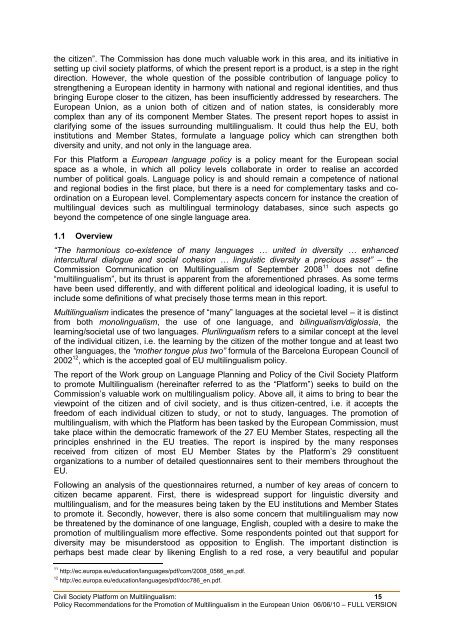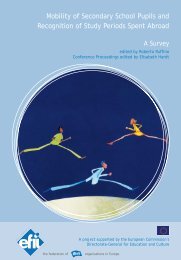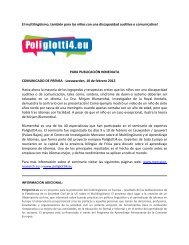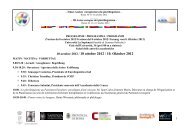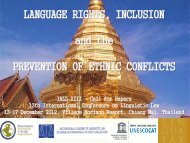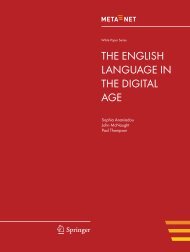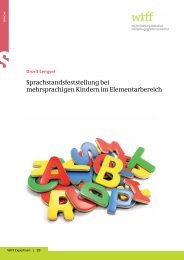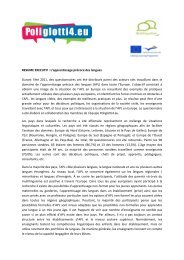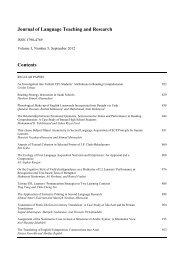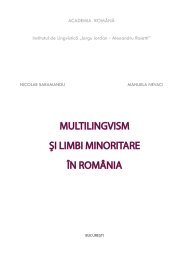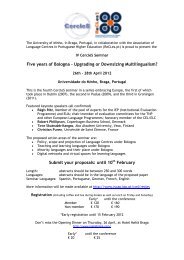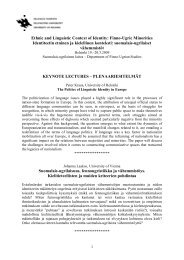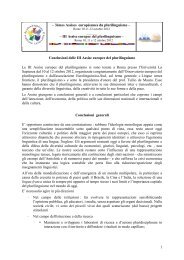FULL VERSION - European Commission - Europa
FULL VERSION - European Commission - Europa
FULL VERSION - European Commission - Europa
Create successful ePaper yourself
Turn your PDF publications into a flip-book with our unique Google optimized e-Paper software.
the citizen”. The <strong>Commission</strong> has done much valuable work in this area, and its initiative insetting up civil society platforms, of which the present report is a product, is a step in the rightdirection. However, the whole question of the possible contribution of language policy tostrengthening a <strong>European</strong> identity in harmony with national and regional identities, and thusbringing Europe closer to the citizen, has been insufficiently addressed by researchers. The<strong>European</strong> Union, as a union both of citizen and of nation states, is considerably morecomplex than any of its component Member States. The present report hopes to assist inclarifying some of the issues surrounding multilingualism. It could thus help the EU, bothinstitutions and Member States, formulate a language policy which can strengthen bothdiversity and unity, and not only in the language area.For this Platform a <strong>European</strong> language policy is a policy meant for the <strong>European</strong> socialspace as a whole, in which all policy levels collaborate in order to realise an accordednumber of political goals. Language policy is and should remain a competence of nationaland regional bodies in the first place, but there is a need for complementary tasks and coordinationon a <strong>European</strong> level. Complementary aspects concern for instance the creation ofmultilingual devices such as multilingual terminology databases, since such aspects gobeyond the competence of one single language area.1.1 Overview“The harmonious co-existence of many languages … united in diversity … enhancedintercultural dialogue and social cohesion … linguistic diversity a precious asset” – the<strong>Commission</strong> Communication on Multilingualism of September 2008 11 does not define“multilingualism”, but its thrust is apparent from the aforementioned phrases. As some termshave been used differently, and with different political and ideological loading, it is useful toinclude some definitions of what precisely those terms mean in this report.Multilingualism indicates the presence of “many” languages at the societal level – it is distinctfrom both monolingualism, the use of one language, and bilingualism/diglossia, thelearning/societal use of two languages. Plurilingualism refers to a similar concept at the levelof the individual citizen, i.e. the learning by the citizen of the mother tongue and at least twoother languages, the “mother tongue plus two” formula of the Barcelona <strong>European</strong> Council of2002 12 , which is the accepted goal of EU multilingualism policy.The report of the Work group on Language Planning and Policy of the Civil Society Platformto promote Multilingualism (hereinafter referred to as the “Platform”) seeks to build on the<strong>Commission</strong>’s valuable work on multilingualism policy. Above all, it aims to bring to bear theviewpoint of the citizen and of civil society, and is thus citizen-centred, i.e. it accepts thefreedom of each individual citizen to study, or not to study, languages. The promotion ofmultilingualism, with which the Platform has been tasked by the <strong>European</strong> <strong>Commission</strong>, musttake place within the democratic framework of the 27 EU Member States, respecting all theprinciples enshrined in the EU treaties. The report is inspired by the many responsesreceived from citizen of most EU Member States by the Platform’s 29 constituentorganizations to a number of detailed questionnaires sent to their members throughout theEU.Following an analysis of the questionnaires returned, a number of key areas of concern tocitizen became apparent. First, there is widespread support for linguistic diversity andmultilingualism, and for the measures being taken by the EU institutions and Member Statesto promote it. Secondly, however, there is also some concern that multilingualism may nowbe threatened by the dominance of one language, English, coupled with a desire to make thepromotion of multilingualism more effective. Some respondents pointed out that support fordiversity may be misunderstood as opposition to English. The important distinction isperhaps best made clear by likening English to a red rose, a very beautiful and popular11http://ec.europa.eu/education/languages/pdf/com/2008_0566_en.pdf.12http://ec.europa.eu/education/languages/pdf/doc786_en.pdf.Civil Society Platform on Multilingualism: 15Policy Recommendations for the Promotion of Multilingualism in the <strong>European</strong> Union 06/06/10 – <strong>FULL</strong> <strong>VERSION</strong>


